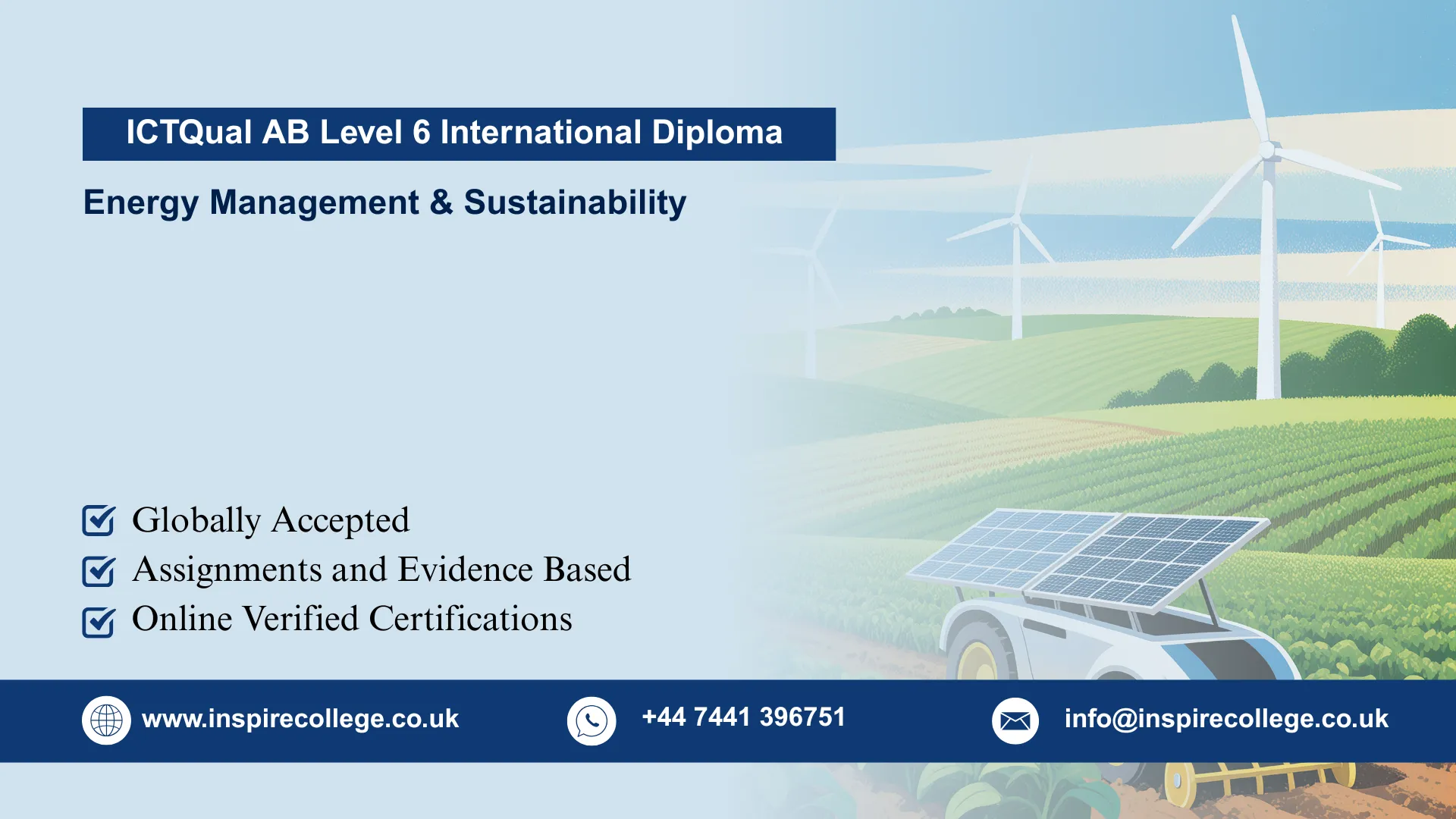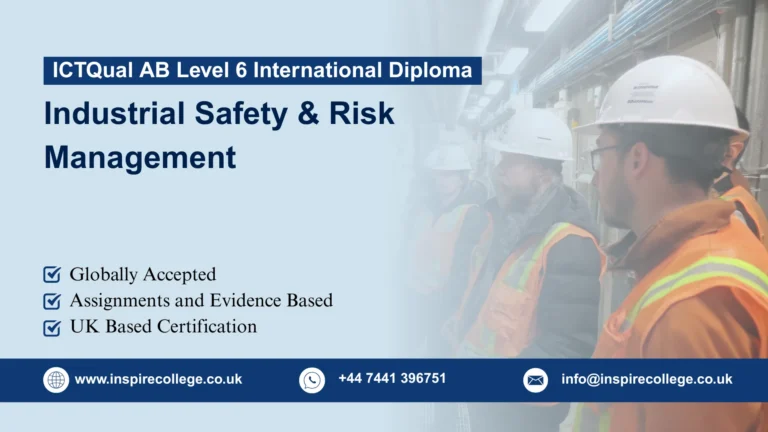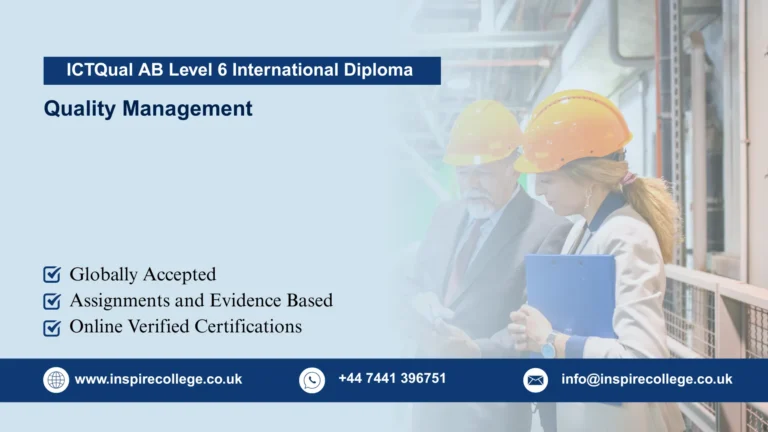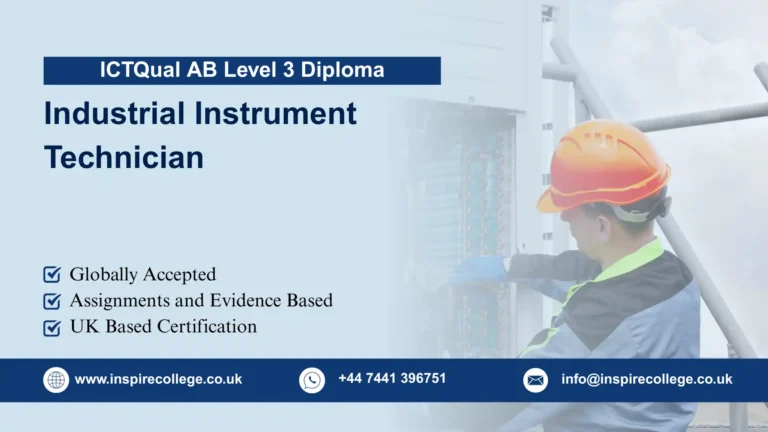
ICTQual ABLevel 6 International Diploma in Energy Management & Sustainability
The growing global focus on sustainable energy practices and efficient resource management has made expertise in energy management and sustainability more critical than ever. The ICTQual AB Level 6 International Diploma in Energy Management & Sustainability is designed to equip learners with advanced knowledge, practical skills, and professional competencies required to drive sustainable energy initiatives and make a meaningful impact in the energy sector.
This three-year, 360-credit programme caters to both fresh learners aspiring to enter the energy industry and experienced professionals seeking to enhance their technical expertise and leadership capabilities. The course provides a comprehensive curriculum covering energy efficiency, sustainability strategies, renewable energy integration, energy auditing, policy frameworks, and environmental compliance, ensuring learners gain a thorough understanding of modern energy management principles.
Learners will develop practical skills in energy monitoring, system optimization, sustainability reporting, and strategic decision-making, as well as proficiency in using digital tools and software for energy analysis and project management. The programme also emphasizes health, safety, environmental standards, and regulatory compliance, preparing graduates to manage complex energy projects in alignment with international best practices.
Upon successful completion, learners will be equipped to pursue roles in energy consultancy, sustainability management, corporate energy planning, government energy agencies, and environmental organizations. The diploma fosters capabilities in analytical thinking, problem-solving, and strategic leadership, enabling graduates to implement innovative solutions for energy efficiency and sustainability. This globally recognized qualification combines theoretical knowledge with applied expertise, empowering learners to become leaders in energy management and sustainability initiatives worldwide, supporting the transition to a more sustainable and resource-efficient future.
To enrol in the ICTQual AB Level 6 International Diploma in Energy Management & Sustainability, learners must meet specific eligibility criteria to ensure they are prepared for this advanced programme. These requirements accommodate both fresh learners and experienced professionals seeking to enhance their expertise in energy management and sustainability.
Age Requirement
- Learners must be at least 18 years old at the time of enrolment.
Educational Qualifications
- Applicants should hold a Level 5 Diploma, Higher National Diploma (HND), or equivalent in energy management, environmental science, engineering, or related disciplines.
- Fresh learners with a strong foundation in science, engineering, or technology may also be considered.
Professional Experience (Optional)
- While not mandatory, learners with 1–2 years of relevant professional experience in energy management, sustainability projects, environmental consultancy, or related fields are encouraged to apply to enhance practical understanding.
English Language Proficiency
- Learners must demonstrate proficiency in English through IELTS (5.5 or above), TOEFL, or an equivalent recognised qualification.
- This ensures effective engagement with course materials, assignments, and assessments.
Related Course Option
- Learners interested in complementary expertise may consider the ICTQual AB Level 6 International Diploma in Renewable Energy, which enhances knowledge of sustainable and clean energy technologies.
By meeting these entry requirements, learners will be fully prepared to undertake this three-year, 360-credit programme, gaining the technical knowledge, practical skills, and professional competencies required to excel in energy management, sustainability planning, and leadership roles within organizations and across the global energy sector.
Mandatory Units
This qualification, the ICTQual ABLevel 6 International Diploma in Energy Management & Sustainability, consists of 36 mandatory units.
Year 1 – Foundation in Energy Management & Sustainability
- Principles of Energy Systems
- Introduction to Sustainability Concepts
- Energy Auditing Fundamentals
- Environmental Science and Climate Principles
- Energy Conversion and Efficiency Basics
- Renewable Energy Overview
- Health, Safety, and Environmental Awareness
- Energy Measurement and Instrumentation
- Laboratory Techniques in Energy Systems
- Technical Report Writing
- Introduction to Energy Simulation Software
- Fundamentals of Carbon Management
Year 2 – Intermediate Energy Management & Sustainability
- Advanced Energy Auditing Techniques
- Sustainable Energy Technologies
- Energy Management Systems (EnMS)
- Environmental Impact Assessment and Compliance
- Energy Efficiency Optimisation Strategies
- Carbon Reduction and Climate Mitigation Practices
- Smart Grids and Energy Distribution
- Process Control and Automation in Energy Systems
- Project Planning and Technical Communication
- Quality Control and Assurance in Energy Projects
- Data Analysis and Monitoring for Sustainability
- Energy Policy, Regulations, and Standards
Year 3 – Advanced Energy Management & Sustainability
- Strategic Energy Management and Optimisation
- Energy Project Management and Leadership
- Emerging Technologies in Renewable and Sustainable Energy
- Energy Storage and Grid Integration
- Sustainability Reporting and Corporate Responsibility
- Risk Assessment and Hazard Analysis in Energy Projects
- Advanced Laboratory Techniques and Field Testing
- Carbon Accounting and Life Cycle Assessment
- Supply Chain and Logistics in Sustainable Energy
- Capstone Project in Energy Management & Sustainability
- Professional Development and Leadership in Energy
- Strategic Decision-Making for Energy Efficiency
The ICTQual AB Level 6 International Diploma in Energy Management & Sustainability is designed to equip learners with advanced knowledge, practical skills, and professional competencies required to excel in energy management, sustainability planning, and environmental leadership. This three-year, 360-credit programme ensures learners develop foundational, intermediate, and advanced capabilities in energy systems, carbon management, sustainability practices, and strategic decision-making in the energy sector.
Year 1 – Foundation in Energy Management & Sustainability
Principles of Energy Systems
- Explain fundamental concepts of energy generation, conversion, and distribution.
- Analyse energy flow in various systems for efficiency and sustainability.
- Apply theoretical knowledge to basic energy system models.
Introduction to Sustainability Concepts
- Define sustainability principles and frameworks in energy contexts.
- Evaluate environmental, social, and economic impacts of energy use.
- Apply sustainability concepts to practical energy scenarios.
Energy Auditing Fundamentals
- Conduct basic energy audits and identify areas for improvement.
- Analyse energy consumption data and prepare preliminary audit reports.
- Recommend efficiency measures based on audit findings.
Environmental Science and Climate Principles
- Understand the scientific principles of climate change and environmental systems.
- Assess environmental impacts of energy generation and consumption.
- Apply environmental knowledge to support sustainable decision-making.
Energy Conversion and Efficiency Basics
- Explain energy conversion processes and system efficiencies.
- Analyse performance metrics of energy systems.
- Apply techniques to improve energy utilization in practical scenarios.
Renewable Energy Overview
- Identify different renewable energy sources and technologies.
- Evaluate benefits, limitations, and applications of renewable solutions.
- Apply basic knowledge to small-scale renewable projects.
Health, Safety, and Environmental Awareness
- Identify workplace hazards and implement safety protocols.
- Comply with environmental regulations and sustainability practices.
- Apply safety standards in laboratory and field settings.
Energy Measurement and Instrumentation
- Operate measurement instruments for energy monitoring.
- Analyse collected data for system performance evaluation.
- Apply instrumentation knowledge to improve energy efficiency.
Laboratory Techniques in Energy Systems
- Conduct experiments to validate theoretical energy concepts.
- Interpret laboratory results and prepare technical reports.
- Apply practical skills to energy system testing and troubleshooting.
Technical Report Writing
- Prepare structured reports on energy audits, experiments, and projects.
- Communicate technical data effectively to diverse audiences.
- Apply professional documentation standards.
Introduction to Energy Simulation Software
- Operate basic energy modeling and simulation tools.
- Analyse simulation outputs for energy system optimization.
- Apply software skills in practical energy project scenarios.
Fundamentals of Carbon Management
- Understand carbon accounting principles and greenhouse gas measurement.
- Analyse emissions data and identify reduction opportunities.
- Apply foundational carbon management strategies in energy systems.
Year 2 – Intermediate Energy Management & Sustainability
Advanced Energy Auditing Techniques
- Conduct comprehensive energy audits for commercial and industrial systems.
- Analyse complex energy consumption patterns and identify savings potential.
- Apply advanced methodologies to develop actionable efficiency plans.
Sustainable Energy Technologies
- Evaluate emerging technologies in renewable and sustainable energy.
- Analyse technical performance and economic feasibility.
- Apply knowledge to design sustainable energy solutions.
Energy Management Systems (EnMS)
- Develop and implement EnMS frameworks in organizations.
- Monitor energy performance using ISO 50001 standards.
- Apply continuous improvement practices to achieve efficiency targets.
Environmental Impact Assessment and Compliance
- Conduct environmental impact assessments for energy projects.
- Ensure compliance with regulations and sustainability standards.
- Apply mitigation strategies to minimize environmental risks.
Energy Efficiency Optimisation Strategies
- Analyse system inefficiencies and propose improvements.
- Implement strategies for operational and process efficiency.
- Evaluate the impact of efficiency measures on costs and sustainability.
Carbon Reduction and Climate Mitigation Practices
- Develop carbon reduction strategies aligned with national and global targets.
- Apply mitigation practices in energy projects to minimize emissions.
- Monitor and report progress on carbon reduction initiatives.
Smart Grids and Energy Distribution
- Understand smart grid technologies and applications.
- Analyse load management and distribution network performance.
- Apply smart grid solutions to optimize energy delivery and reliability.
Process Control and Automation in Energy Systems
- Implement automation and control systems for energy efficiency.
- Monitor and adjust processes using modern instrumentation and software.
- Apply control techniques to optimize system operations.
Project Planning and Technical Communication
- Develop detailed energy project plans with schedules and budgets.
- Communicate technical information effectively to stakeholders.
- Apply project management principles to energy and sustainability projects.
Quality Control and Assurance in Energy Projects
- Monitor energy projects for quality, compliance, and performance standards.
- Apply corrective actions and continuous improvement strategies.
- Ensure adherence to organizational and regulatory quality requirements.
Data Analysis and Monitoring for Sustainability
- Collect and analyse energy and sustainability performance data.
- Use analytical tools to support decision-making and optimization.
- Apply monitoring techniques to enhance project outcomes.
Energy Policy, Regulations, and Standards
- Understand key energy policies, regulations, and international standards.
- Analyse the implications of legislation on energy projects.
- Apply regulatory knowledge to ensure compliance and sustainable practices.
Year 3 – Advanced Energy Management & Sustainability
Strategic Energy Management and Optimisation
- Develop strategies for energy optimization at organizational and project levels.
- Apply strategic planning tools to improve energy performance.
- Evaluate outcomes and implement efficiency improvements.
Energy Project Management and Leadership
- Lead energy management projects with multidisciplinary teams.
- Plan, execute, and monitor projects effectively.
- Apply leadership and decision-making skills in complex energy environments.
Emerging Technologies in Renewable and Sustainable Energy
- Analyse innovations in renewable energy and sustainability technologies.
- Evaluate feasibility and scalability of emerging solutions.
- Apply knowledge to implement innovative energy projects.
Energy Storage and Grid Integration
- Understand advanced energy storage technologies and applications.
- Analyse grid integration challenges and solutions.
- Apply storage strategies to enhance system reliability and sustainability.
Sustainability Reporting and Corporate Responsibility
- Prepare sustainability reports in accordance with global standards.
- Analyse corporate energy performance and social responsibility initiatives.
- Apply reporting tools to communicate progress to stakeholders.
Risk Assessment and Hazard Analysis in Energy Projects
- Identify potential operational and environmental risks.
- Conduct hazard analyses and develop mitigation strategies.
- Apply risk management practices to enhance safety and reliability.
Advanced Laboratory Techniques and Field Testing
- Conduct advanced experiments and field tests on energy systems.
- Interpret results to validate theoretical models and practical applications.
- Apply laboratory findings to optimize system performance.
Carbon Accounting and Life Cycle Assessment
- Measure and analyse carbon emissions across energy systems.
- Conduct life cycle assessments to evaluate environmental impact.
- Apply carbon accounting strategies for sustainable energy operations.
Supply Chain and Logistics in Sustainable Energy
- Manage procurement, logistics, and supply chains for energy projects.
- Apply sustainable practices in sourcing, transportation, and distribution.
- Optimise energy project operations through efficient supply chain management.
Capstone Project in Energy Management & Sustainability
- Integrate knowledge and skills acquired throughout the programme.
- Conduct an independent research or practical project in energy management.
- Present professional reports and project outcomes demonstrating expertise.
Professional Development and Leadership in Energy
- Develop leadership and management skills for energy and sustainability projects.
- Plan career growth and professional development strategies.
- Apply ethical, professional, and strategic standards in energy initiatives.
Strategic Decision-Making for Energy Efficiency
- Analyse complex data and operational scenarios to make informed decisions.
- Develop strategies to optimize energy efficiency and sustainability outcomes.
- Apply strategic thinking to drive organizational energy performance improvements.
Upon completion of the ICTQual AB Level 6 International Diploma in Energy Management & Sustainability, learners will have acquired advanced technical knowledge, practical skills, and professional competencies required to excel in energy management, sustainability, and leadership roles.
The ICTQual AB Level 6 International Diploma in Energy Management & Sustainability is designed for learners who are motivated to advance their knowledge and skills in energy efficiency, sustainability, and strategic energy management. Ideal candidates are those seeking to make an impact in the global energy sector through technical expertise and leadership capabilities.
Ideal Learner Profile
- Has a strong interest in energy systems, sustainability, and environmental management.
- Is a fresh learner aiming to start a career in energy management and sustainable technologies.
- Is a working professional looking to enhance expertise in energy auditing, efficiency optimization, and sustainability practices.
- Possesses a background or foundational knowledge in engineering, environmental science, or technology.
- Seeks to develop analytical, problem-solving, and decision-making skills for energy management projects.
- Is motivated to learn digital tools, simulation software, and energy monitoring systems for practical application.
- Wants to understand carbon management, regulatory compliance, and environmental standards in energy operations.
- Is committed to professional growth and intends to pursue leadership or managerial roles in energy and sustainability projects.
- Aims to work in corporate energy management, consultancy, renewable energy firms, government agencies, or sustainability-focused organizations.
Graduates of this programme will be fully equipped to apply their knowledge and skills in energy management and sustainability initiatives, making a measurable impact on organizational efficiency, environmental responsibility, and sustainable development worldwide
As an approved ICTQual AB Training Centre, learners must enrol with us to undertake the ICTQual AB Level 6 International Diploma in Energy Management & Sustainability. The programme offers two certification routes to cater to both experienced professionals and fresh learners, ensuring flexibility while maintaining international standards.
Certification Route for Experienced Professionals
- Designed for learners with at least 6 years of verifiable professional experience in energy management, sustainability projects, environmental consultancy, or related sectors.
- Learners can leverage their prior work experience to gain recognition for practical competencies.
- Experience-based learners are required to complete selected strategic and project-based assessments, focusing on leadership, decision-making, and applied energy management skills.
- This route is ideal for professionals seeking fast-tracked recognition while demonstrating advanced expertise in energy management and sustainability practices.
Certification Route for Fresh Learners
- Intended for learners entering the field with little or no prior professional experience.
- Fresh candidates are required to complete all 36 assignments across the programme to demonstrate mastery of theoretical knowledge, practical skills, and project management competencies.
- This route ensures learners develop a comprehensive understanding of energy systems, sustainability strategies, and regulatory compliance.
- By completing all assignments, fresh learners meet the same internationally recognized standards expected of professional graduates.
By enrolling with our ICTQual AB Approved Training Centre, all learners gain full access to course materials, expert guidance, and assessment support, ensuring successful completion of the programme. Upon meeting the requirements of their chosen route, learners will be awarded the ICTQual AB Level 6 International Diploma in Energy Management & Sustainability, recognized globally for technical excellence, sustainability expertise, and professional competence in the energy sector.
Register Now
FAQs for ICTQual AB Level 6 International Diploma in Energy Management & Sustainability






